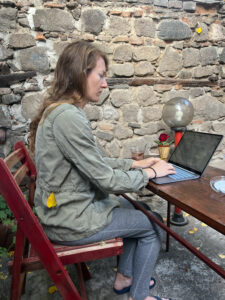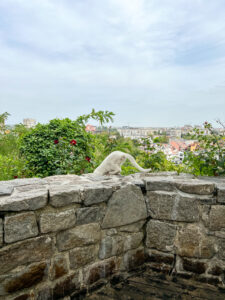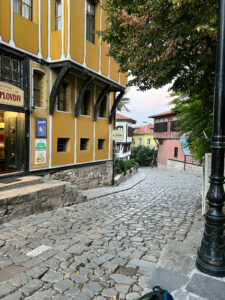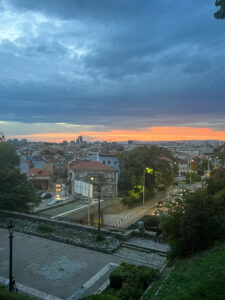

When we left Turkey, I was exhausted. Mentally I was nowhere close to burnt out on traveling, but physically the exertion of nonstop and fast-paced travel for 2 and ½ months had caught up to me. For several days I felt like I was teetering on the edge of being sick, and several days of 5am wake-ups followed by a night train journey made me feel dizzy and insane.
It was mid-September. I’d reached almost the halfway point of my trip, and I had complicated feelings about it. On one hand, I felt this urgency about running out of time on my trip to do everything I hoped to do, which of course made me feel more exhausted. Time felt like it was moving too fast. One the other hand, it felt like a sigh of relief that we were past the rushed part of the journey. I’d had to move at a certain pace to reach Turkey by the correct date for the tour, and there hadn’t been a ton of wiggle room until that point. After the tour, our time was less structured. There were segments of the trip that I hadn’t planned yet. It was freeing to know that now we were only operating under whatever agenda we set for ourselves. The weather would start to change, and we would slow down. We took the night train from Turkey back to Bulgaria simply because it was the most direct route over land to get to Greece. My only real intention for the two nights I decided to stay in Bulgaria was to recuperate.
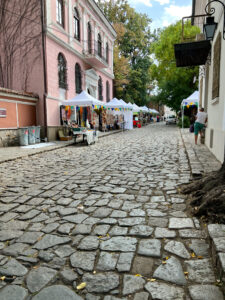
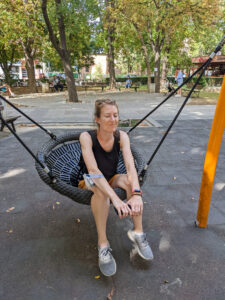
We arrived in Plovdiv, Bulgaria, just after sunrise. Plovdiv had not been a place that I was certain I’d keep on my itinerary, but I’m so glad I did. It ended up being one of the most adorable towns I visited. It was often the places I had no expectations for that end up being the most memorable. Our Airbnb hosts generously allowed us to check into our room right when we arrived, so we spent most of the morning sleeping since we didn’t get to sleep much on the train. Then we spent the next 24 hours with no agenda, and it was wonderful.
Plovdiv is considered the oldest continuously inhabited city in Europe and one of the oldest in the entire world. You can see traces of 8,000 years of history here without even seeking it out. Plovdiv had a lot of names throughout history, but perhaps the most famous name was Philippopolis after Philip the Great, king of ancient Macedonia (and Alexander the Great’s father). It’s been ruled by the Macedonians, Persians, Celts, Romans, Byzantines, Goths, Huns, Turks, and Thracians. It’s simply too much history to wrap one’s mind around in a single visit, and I could have stayed for weeks just trying to piece together the timeline of how this place came to exist. Today, ancient ruins are scattered throughout the Old Town—just a casual part of regular life for the people who live there instead of the astonishing wonder they were for me. The ancient amphitheater that sits in the middle of town is over 2,000 years old and they still hold nightly concerts in it.
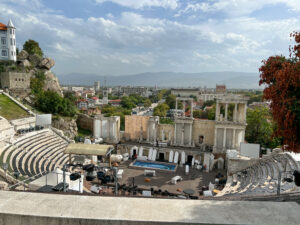
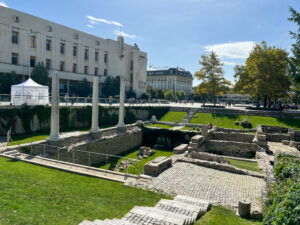
In Plovdiv, I learned a lot about European Capitals of Culture. I’d heard this term before, but I didn’t have a good understanding of what it meant until I chatted with our walking tour guide about it in Plovdiv. Basically it’s this cultural initiative where cities can apply and then the EU selects one (or 2 or 3) of them to be the “Capital of Culture” each year, and during their appointed year, the city is filled with events and celebrations of art and culture. It’s about celebrating the diversity of cultures throughout Europe, but also the cities are given a lot of money for revitalization efforts and to bring in tourism. This initiative started in the 1980s, and for the first 15 years or so, the cities chosen were major capital cities like Paris, Amsterdam, and Madrid. In the past 20 years or so though, the cities selected have been smaller, less-visited cities, and being selected as a Capital of Culture has brought awareness to tourists about some cities that have since become more popular (places like Porto, Bologna, and Reykjavik). Now Capitals of Culture seem to be towns and cities that are underrated, a bit off the beaten tourist path, full of cultural activities, and 100% worth your time. Plovdiv was a Capital of Culture in 2019, and in spite of the setbacks that I’m sure the city faced during the pandemic, it was still easy to see the art, creativity, and energy that it brought to the city.
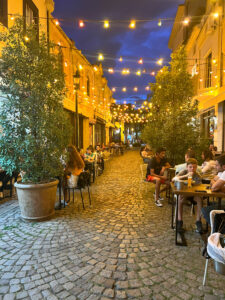
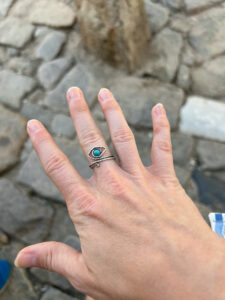
The central part of the Old Town in Plovdiv is pedestrian-only. For only $44, we got to stay in an Airbnb in the very center of Old Town. There was a street festival with live music and some of the best street food I’ve ever tasted that night, and it was so close to our apartment that we were able to watch the concert from our patio chairs. Old Town is full of cobblestone streets, dogs that walk off leash (my favorite was named Marley), and art venders. I bought a ring from an art booth set up on the sidewalk for like $4, and I’ve worn it most days since. We did a walking tour the next morning to learn more about the history of the city, and we saw dance groups performing alongside 2,000-year-old ruins. We ate at a restaurant that served us a giant clay pot of stewed fish and vegetables like I imagine people were eating there 2,000 years ago, and then the next morning we ate vegan chia seed pudding. This is a city where youth and modernity thrive alongside their history—my favorite type of city.

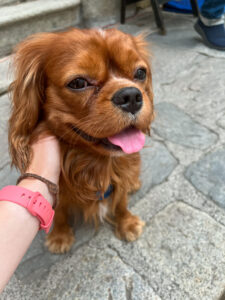
We only had a day and a half in Plovdiv, even though it felt like longer. It was enough to bring some of my energy back. We took a train back to Sofia and spent one night there before catching our bus to Greece the next day. We met an American woman who was traveling solo while we waited on our train in the Plovdiv station. She was older—probably in her 50s—and told us about how she’d been staying in an Airbnb in southern Turkey when the owners unexpectedly invited her to their wedding. She went, and she spent the next week hanging out with this kind family even though none of them spoke the same language. “I have a Facetime call planned with the dad tonight!” she told us “…even though he doesn’t speak English and I don’t speak Turkish!” By this point on the trip, this didn’t shock me. People can always figure out a way to communicate when they want to.
She had traveled to Turkey via Bulgaria a few weeks before just like we had. “Doesn’t it feel comforting and easy to go back to a place you’ve been even once,” she asked us? And weirdly, it did. Even though we’d only spent one night in Sofia before heading to Turkey, it felt easy to go back through for a pit-stop—we knew how to catch a taxi (we used a local ride-share app that Michael diligently researched the first time), knew the local currency, knew where the best restaurants were congregated, knew where to buy toothpaste. Traveling to new places is endlessly exciting, but traveling somewhere you’ve seen before, no matter how briefly, is exciting for entirely different reasons.
We got to Sofia late, and when we woke up the next morning, it was cold outside. It was the first hint that summer was starting to fade. We caught our bus to Greece to chase a couple more weeks of summer before Michael headed home.
